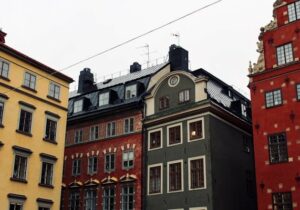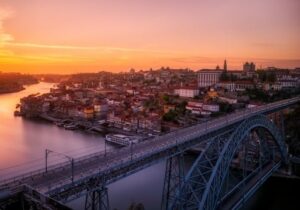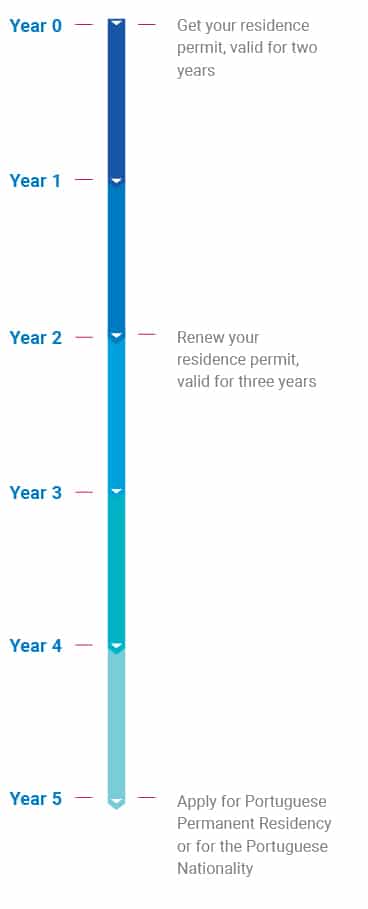
Also known as the Portugal Passive Income Visa or Retirement Visa, the D7 Visa is particularly favored by non-EU retirees who want to set up a base in Portugal and enjoy the country’s stunning landscapes and exceptional living standards.
One of the top D7 Visa benefits is that it allows holders to apply for Portuguese citizenship after five years of legal residency in Portugal, provided the requirements are met.
We’ve compiled this expert guide to help you understand the D7 Visa Portugal easily. Inside, you’ll find valuable information about:
D7 Passive Income Visa Portugal: An Overview
The Portugal D7 Visa is a residence visa program that allows individuals with sufficient passive income to live in Portugal without working. It’s particularly popular with retirees, real estate investors, and those who rely on passive income from sources like pensions, investment income, or royalties. Below is an overview of eligibility requirements and application processes for this visa program.
Eligibility and requirements
- Sufficient passive income: Applicants must demonstrate a regular and predictable income that can support them without relying on employment.
- Minimum income threshold: As of 2025, the minimum income requirement is €870 per month, or €10,440 per year.
- Accommodation: Applicants need to have a place to live in Portugal, either by owning or renting property.
- Other requirements: A clean criminal record, valid health insurance, and a complete visa application process at the Portuguese consulate or embassy. Family members, including spouses, partners, and dependent children, can also apply for residency under the D7 Visa, provided the applicant can demonstrate sufficient income to support them.
Portugal D7 Visa income requirements: Eligible sources of income
- Pensions: Retirement pensions and other pension income qualify.
- Real estate: Rental income from properties in Portugal or elsewhere can contribute to the passive income requirement.
- Investments: Income from stocks, dividends, mutual funds, or other investments can be considered.
- Royalties and intellectual property: Earnings from intellectual property or royalties can also qualify.
- Business dividends: Dividends from businesses, provided the applicant is not actively involved in the company’s management, can be used to meet the income requirement.
Application process
- Gather necessary documents: This includes proof of income (bank statements, tax returns, pension statements, etc.), accommodation, and other relevant documents.
- Submit application: The application must be submitted to the nearest Portuguese consulate or embassy.
- Wait for approval: Processing times for the Portugal D7 passive income visa can vary, and a temporary visa is granted upon approval.
- Apply for a residence permit: Upon arrival in Portugal, applicants must schedule an appointment with AIMA to apply for a residence permit.
D7 Visa Portugal Requirements
The Portugal D7 Visa, also known as the passive income visa, allows non-EU citizens with a stable and sufficient passive income to reside in Portugal. Key requirements include a completed application form, a valid passport, two passport photos, proof of passive income, proof of accommodation, a clean criminal record, and valid travel insurance.
General Portugal D7 Visa requirements
- Non-EU citizen: You must not be a citizen of an EU, EEA, or Swiss country.
- A completed D7 visa application form
- Valid passport with at least two blank pages
- A Portugal NIF number (Fiscal Number)
- Two recent passport photos
- Stable passive income: You need proof of a reliable income source from sources outside Portugal, usually through bank statements like pensions, rental income, royalties, or dividends. You should also have proof of sustainable passive income. The minimum income requirement is calculated based on the Portuguese minimum wage, currently €870 per month (€10,440 per year).
- Clean criminal record: You must have a clean criminal record certificate from your current and previous places of residence.
- Proof of accommodation in Portugal: You need proof of adequate accommodation, such as a rental agreement or property deed.
- Sufficient funds: You need to demonstrate that you have enough financial resources to support yourself, even if you don’t have a Portuguese bank account.
- Travel insurance: You need valid health insurance that covers all medical expenses.
Document requirements
- Completed D7 Visa application form
- Valid passport: Must be valid for at least 6 months beyond your intended stay.
- Passport photos: Two recent passport-sized photos.
- Proof of passive income: Bank statements, tax declarations, contracts, etc., demonstrating stable income.
- Proof of accommodation: Rental agreement, property deed, or letter from a resident stating you will be living with them.
- Criminal record check: From your current country of residence and any other country where you have lived for over a year in the past five years.
- Proof of health insurance: Covering medical expenses.
- Other documents: Depending on your family situation, you may need marriage certificates, birth certificates, etc.
Additional tips for the Portugal passive income visa
- Portuguese bank account: It’s highly recommended to open a Portuguese bank account to facilitate financial transactions and prove financial stability.
- NIF (Fiscal Number): You’ll need a Portuguese NIF number.
- Spending time in Portugal: You’re required to spend at least 16 months in Portugal during the first two-year period.
- Residency permit: After receiving the visa, you’ll need to apply for a temporary residence permit upon arrival in Portugal.
Other important information about the Portugal passive income D7 Visa
Once you have met the Portugal passive income D7 Visa requirements, this non-lucrative visa Portugal program also allows for the following:
- Family reunification: The D7 visa allows you to bring immediate family members to Portugal.
- Right to work: While the visa is designed for those with passive income, D7 visa holders are not restricted from working in Portugal.
- Schengen area travel: The D7 visa allows you to travel within the Schengen area without needing a separate visa.
Portugal D7 Benefits
The D7 Visa Portugal 2025 provides various benefits for foreign passive income earners, non-EU retirees, and their dependents, with key advantages including:
1. Visa-free travel: Holders of the D7 Visa Portugal can explore the Schengen area and move freely across the European Union for a specified period without being required to produce additional visas or travel permits.
2. Permanent residency and citizenship: After five years of legal residency, holders can apply for permanent residency or Portuguese nationality, enabling them to obtain a Portuguese passport with visa-free access to 174 countries.
3. Rights as a Portuguese resident: You gain access to the Portuguese national health service system and the country’s robust education system. You can work, enjoy legal protection, and access vocational training and professional development opportunities.
4. Family reunification: The Portugal D7 Visa allows the main applicant to bring family members, including spouses, children under 18, dependent parents, siblings, or children over 18, who can enjoy similar benefits.
Who is eligible to apply for the Portugal Passive Income Visa?
To be eligible for the Portugal D7 Visa, also known as the Portugal Retirement Visa, and start your journey toward obtaining Portuguese residency, the main applicant must be a non-EU national and meet certain passive income requirements. You’ll need to show that you have enough funds in a Portuguese bank account to support yourself during your stay.
Here are the key requirements for the initial residency permit under the Portugal D7 Visa:
- Nationality: You must not be an EU citizen.
- Financial self-sufficiency: You must demonstrate that you have enough financial resources to support yourself while living in Portugal.
- Clean criminal record: A background check is required to ensure you have no criminal history.
- Proof of residency: You must have a confirmed address in Portugal. This can be shown with a rental agreement or a document from a Portuguese resident confirming that you will live in their home.
- Physical presence: You must spend at least 16 months in Portugal during the initial two-year period.

Portugal D7 Visa Requirements 2025
Proof of sufficient passive income
Meeting the minimum income requirement is crucial for the Portugal D7 Visa. You must demonstrate a stable and regular passive income that is at least equivalent to the Portuguese minimum wage, which is €870.00 in 2025. This income can come from various sources, such as:
- Social Security benefits (Pensions)
- Rental income
- Dividends
- Transferable equity
- Intellectual property
Additionally, you must provide Portuguese bank statements showing a minimum balance equal to one year’s minimum wage (€10,440.00) during your two-year application period. This amount is calculated as €870.00 x 12 months.
This balance increases if you have family members:
- An extra 50% (€5,220.00) for a spouse or any family member over 18.
- An extra 30% (€3,132) for each child under 18.
Single Applicant | Applicant + Spouse | Applicant + Spouse and Child | Applicant + Spouse and 2 Children | |
Minimum Bank Balance | €10,440 | €10,440 + €5,220 | €15,660 + €3,132 | €15,660 + €6,264 |
€15,660 | €18,792 | €21,924 |
Proof of accommodation

The documentation should clearly state the address of the property, the duration of the rental or stay, and the names of the tenants or occupants. The agreement should also include the rental amount and payment terms if you are renting.
If you are staying with a friend or family member, a signed declaration from your host confirming that they will provide accommodation may be required. This should include their address, the duration of your stay, and their contact details.
Get a NIF number
Securing a NIF (Número de Identificação Fiscal) is essential for living in Portugal, as it allows you to engage in various fiscal activities. Non-residents like D7 applicants just starting the process, must appoint a fiscal representative to apply for their tax identification number in Portugal on their behalf. Each individual is assigned a unique, nine-digit NIF for tax purposes.
Opening a Portuguese bank account
Once you have your NIF, you can open a bank account in Portugal, often remotely, which simplifies transactions and helps avoid currency exchange fees. If you are a non-resident with an NIF, banks like ActivoBank, Banco N26, and Millenium BCP allow you to open accounts online. However, you often need a video call to verify your identity. In most cases, some of the required documents include proof of address, confirmation of NIF, a Portuguese phone number, and a minimum cash deposit, typically €250-300.
Travel and health insurance
Portugal D7 Visa applicants must have travel insurance at the time of the visa application and have health insurance coverage by the time of their AIMA appointment, ensuring coverage while residing in Portugal during the application process. Numerous private insurance plans in Portugal can be directly debited from your newly opened Portuguese bank account. After moving to Portugal, you can enroll in the Portuguese public health system (SNS), which can be used to renew your residence permit later.
Criminal record certificate
To apply for the Portugal D7 visa, you must provide a criminal record certificate. For US citizens, this means obtaining a criminal background check similar to the one from the FBI. Portuguese immigration generally favors applicants with a clean criminal record, meaning no convictions for crimes that carry a prison sentence of more than one year. In some situations, applicants with criminal records may still be eligible, so it’s wise to consult an immigration lawyer for specific guidance. Global Citizen Solutions can assist with any concerns regarding this aspect of your application.
Maintain minimum residency
Once you receive your temporary residency permit, you must be present in Portugal for a minimum of 12 to 16 months in the initial two years after receiving your residency permit. This changes to 28 months in the country every three years after the first renewal.
Exceptions can apply for work-related reasons or other specific situations. In such cases, you must explain your absence to AIMA before leaving. Additionally, you may be exempt if you can prove residency in your home country while abroad, supported by professional, business, social, or cultural activities.
It’s also essential to keep valid health insurance coverage throughout your stay.
Portugal D7 Visa Required Documents
Here’s a complete list of the necessary documents you’ll need to secure your residency when applying for the Portugal D7 Visa:
- Proof of regular passive income
- Proof of accommodation in the form of a 12-month lease or a property purchase agreement
- Confirmation of Portuguese tax number (NIF)
- Six months of bank statements
- Clean criminal record background check
- Medical insurance
- Completed Portugal D7 Visa application form
- Valid passport (your passport needs to have an expiry date at least three months later than the duration of your stay in Portugal, and it must have at least two blank pages)
- Two passport photos (passport-sized)
- Valid travel insurance with health coverage
Portugal D7 Visa Application Process
1. Apply for the temporary D7 visa from your home country
2. Attend your AIMA appointment and enroll your biometric data
3. Get your residency card
To obtain your Portugal D7 Visa, you’ll need to start the process at the Portuguese Consulate in your home country. Here’s a simple overview of the steps involved:
- Schedule an appointment: Book a time to submit your visa application and all required documents.
- Pay the application Fee: Pay the necessary fee when you submit your application.
- Wait for review: The review period can take a few weeks to several months. This timeline depends on the Portuguese Consulate, which may request more information during this time.
- Receive temporary residence visa: Once approved, you’ll get a 120-day visa to enter Portugal.
After you receive the D7 Visa, you’re allowed to enter Portugal. There, you must complete a new set of related administrative tasks to obtain your residency permit, which we’re outlining in the section below.
Good to Know: A residency visa and a residency permit serve different purposes. A residency visa is an entry document that allows you to travel to Portugal with the intent to stay long-term. Once in Portugal, you must apply for a residency permit, which legally allows you to live in the country for an extended period. Essentially, the visa gets you into Portugal, while the permit lets you stay. |
Getting your Portugal residency permit

About three weeks after the appointment, you’ll receive a temporary residence card, called a Título de Residência, which is your form of identity in Portugal. It allows you to freely travel around the European Union without additional visas.
The temporary residence permit is valid for two years and can be renewed for another three years. After five years of legally living in Portugal, you can apply for a permanent residency permit or Portuguese citizenship if you meet the necessary criteria.
D7 Visa processing time
Obtaining a temporary four-month visa in your home country can take up to 60 days, provided you submit all the required information. When you receive your visa, you will also have an appointment with AIMA, which the Portuguese Consulate books when they issue your visa.
Once AIMA has collected your documents and biometric data, it will take about three weeks for them to send your residence card to your Portuguese address. The legal deadline for this is 90 days.


Getting Portuguese Citizenship Through the Portugal D7 Visa

- Residency duration: After five years of holding your D7 residency, you are eligible to apply for citizenship. Ensure you’ve adhered to the residency requirements outlined earlier, including spending time in Portugal.
- Language proficiency: To demonstrate your integration into the country, you’ll need to pass a basic Portuguese language test.
- Clean criminal record: It’s important to maintain a clean criminal record throughout your residency. You’ll need to provide documentation proving your good standing in both Portugal and your home country.
- Application process: Begin gathering the necessary documents for your citizenship application, such as proof of residency and evidence of language proficiency.
- Submit your application: Follow the application process through the appropriate government channels to ensure a smooth transition from residency to citizenship.
The Cost of the Portuguese D7 Visa in 2025
The Portugal D7 Visa is a budget-friendly choice compared to programs like the Portugal Golden Visa, which requires a hefty investment starting at €200,000. The D7 Visa, on the other hand, is designed for those with stable passive income. Here’s a breakdown of the processing fees:
- Entry visa application: Approximately €80 at the Portuguese consulate in your home country.
- Resident permit fee: Around €170 for submission and receipt from the AIMA in Portugal.
- AIMA appointment fee: About €156.
- Portugal D7 Visa application fee: Approximately €90.
- Residence permit fee: Around €160.
Note: Fees may change according to the Portuguese immigration authorities.
Portugal D7 Visa Tax Considerations
A holder of the Portugal D7 Visa must establish tax residency in Portugal by spending more than 183 days in the country each fiscal year.
As a tax resident, you can take advantage of the newly enacted Tax Incentive for Scientific Research and Innovation (IFICI), also known as the NHR 2.0 tax regime.
D7 visa holders cannot directly benefit from IFICI’s 20% tax rate, but they may still leverage IFICI’s exemptions on foreign income if they meet residency requirements. Under the scheme, foreign pensions remain taxable at progressive rates of up to 48%.
However, the D7 Visa conditions allow for professional activities at non-Portuguese companies. Essentially, it permits self-employment for companies located overseas, and income earned abroad is tax-exempt in Portugal under this tax regime.
There is a caveat, though. The income can only come from highly qualified professions, such as general and executive managers, medical doctors, engineering, IT, and communication fields.
Cost of Living in Portugal
When considering a move with the D7 Visa, understanding the cost of living in Portugal is essential. Portugal offers an affordable lifestyle compared to many Western European countries, with variations depending on location. Below is a detailed breakdown of the key expenses: healthcare, living costs, and real estate.
Healthcare
Portugal’s healthcare system is known for its high quality and affordability. Residents can access the public healthcare system (SNS), where costs for consultations and treatments are minimal. For example, a basic doctor’s visit typically costs between €5 to €10. Prescription medications are also heavily subsidized.
Many expatriates opt for private health insurance to access shorter wait times and private facilities. Private insurance plans range from €20 to €100 per month, depending on coverage level and age. Even without insurance, a private consultation usually costs around €40 to €70.
Living costs
Portugal offers a comfortable lifestyle at a fraction of the cost of countries like the UK or the US. An average individual’s monthly grocery bill ranges from €150 to €250, and local markets often provide fresh produce at lower prices than supermarkets.
Basic utilities like electricity, heating, water, and garbage cost between €90 to €120 per month for a standard apartment, while internet services add an additional €25 to €35 monthly. Public transport is highly affordable, with monthly passes for buses, metros, and trains costing around €40.
Real estate
The real estate market in Portugal offers diverse options, from modern apartments in Lisbon to traditional houses in smaller towns. To rent a one-bedroom apartment in the city center, the monthly rental is around €900 to €1,200 in cities like Lisbon and Porto. Outside the center, rental prices range between €700 to €900. Rent for a similar apartment drops to around €400 to €700 in smaller towns.
Buying property in Lisbon or Porto can cost between €3,500 and €6,000 per square meter, while less populated areas and the Algarve region can cost as low as €1,500 per square meter.
D7 Visa Alternatives
Portugal Digital Nomad Visa
If you’ve taken the eligibility test and discovered you’re not suited for the D7 Visa in Portugal, don’t worry! The Portugal Digital Nomad Visa is a great alternative as it allows digital nomads to live and work in Portugal for a specific period.
The Digital Nomad Visa is tailored for remote workers, helping to manage their short-term stays in Portugal. You can apply for either a temporary residency permit, which can be extended for up to five years, or a temporary stay visa, valid for one year. To qualify, you must earn at least four times Portugal’s minimum wage, which amounts to €870 each month.
Portugal Golden Visa
The Portugal Golden Visa program is a five-year residency by investment initiative for non-EU nationals. With it, qualifying investors and their family members are granted the right to live, work, and study in Portugal.
Qualifying investments range from investing in private equity funds or the Portuguese Golden Visa venture capital fund, or donating or investing a minimum of €250,000 into qualified projects in Portuguese Arts, National Heritage, or Culture. You can also make a capital transfer equal to or more than €500,000 in research activities conducted by public or private scientific research institutions.
Why choose Global Citizen Solutions for your Immigration Visa?
GLOBAL APPROACH BY LOCAL EXPERTS
- GCS has offices located across Portugal.
- Members of the US-Portugal and UK-Portugal Chambers of Commerce in Portugal, and the Investment Migration Council (IMC).
- Our expert team can help you throughout your journey to secure your Visa.
100% APPROVAL RATE
- Our successful track record in applications provides reassurance to applicants.
- We have helped clients from more than 35 countries secure residency in Portugal.
ALL-ENCOMPASSING SOLUTION
- With a single channel of communication, our approach ensures that you have complete clarity on your application.
- Our BeGlobal® Onboarding System allows for a total flow of information.
TRANSPARENCY AND PRIVACY
- Our pricing is clear and detailed, you will not face any hidden costs.
- All data is stored within a GDPR-compliant database on a secure SSL-encrypted server.

Frequently Asked Questions About the Portugal D7 Visa
Who is eligible for the Portugal D7 Visa?
The D7 Visa is available to non-EU/EEA/Swiss citizens with a stable passive income. Eligible applicants include retirees, remote workers, and entrepreneurs who can prove a minimum monthly income of €870. Dependents may also qualify under the main applicant’s income.
What are the D7 Visa income requirements?
To apply for the D7 Visa, you must have a minimum passive income of €870.00 per month. If including a spouse, you’ll need an additional 50%, and an extra 30% for each dependent child.
What are the Portugal D7 Visa application requirements?
To qualify for the Portugal Passive Income Visa, you must be a non-EU citizen aged 18 or older with stable foreign-sourced income to support yourself. You need a clean criminal record and proof of a residential address in Portugal. Additionally, you must spend at least 16 months in Portugal during the first two years and obtain a Portuguese NIF number.
What is the Portugal D7 Visa minimum stay?
You must be able to spend a minimum of 16 months in Portugal on your temporary D7 Visa within the initial two-year period.
How long does it take to get a D7 Visa for Portugal?
Securing the temporary four-month D7 Visa in your home country can take up to 60 days, and you must submit all the required documents and information.
What are the visa acceptance rate and reasons for rejection?
The rejection rate for the D7 Visa is low, similar to other visa types in Portugal. Common reasons for rejection include invalid travel insurance, insufficient justification for your stay, fake travel documents, and failure to provide proof of accommodation, such as a valid rental agreement.
Is Portugal a good place for retirement?
Portugal is indeed an excellent destination for retirees. Not only is it a safe and stable country, but the climate, friendly people, and high standards of living at a relatively affordable rate are all big draws for retirees seeking a permanent residence permit in Portugal.
Is Portugal expensive?
No, Portugal is by no means considered an expensive country. In the more urban areas of Portugal, it’s possible to live comfortably at €2000 a month. In the less populated areas of Portugal, that figure is even less.
Can I become a Portuguese citizen with a D7 Visa?
While a Portugal D7 Visa doesn’t automatically grant you citizenship, it does enable you to obtain Portuguese residency permit. In Portugal, all Portuguese residents can apply for citizenship after five years. Therefore, the D7 residency visa can indirectly lead you to obtain citizenship after five years.
Can you work in Portugal on a D7 Visa?
Yes, you can work with the Portugal D7 Visa, but there are limitations. While the D7 Visa is primarily for those with passive income, you can engage in freelance work or self-employment. Just ensure your main income source remains passive to maintain your residency status.
How long does a D7 Visa typically last?
A D7 residence permit is initially granted for a period of two years. After this period, it can be renewed for successive periods of three years. After five years of legal residency in Portugal, the visa holder may apply for a permanent residence permit or Portuguese citizenship.
Can I bring my family members with me on a D7 Visa?
Yes, you can bring family members on a D7 Visa through the Family Reunification Program. This includes your spouse, minor or disabled children, dependent adult children studying in Portugal, and first-degree ascendants.
Can I convert my existing visa to a D7 Visa?
Yes, you can potentially convert your existing visa to a D7 Visa, but it depends on the type of your current visa. It’s best to contact the Portuguese consulate in your home country for specific guidance.
Portuguese Golden Visa, D2 Visa, or D7 Visa, which one to pick?
Choosing between the Golden Visa, D2 Visa, and D7 Visa depends on your goals. The Golden Visa is best for investment with minimal stay. The D2 Visa is for those starting a business, while the D7 Visa is for individuals with passive income seeking residency.
Can I travel within the Schengen Area with the Portugal D7 Visa?
Yes. Upon receiving D7 residence permit, the visa holder can freely enter and circulate in the Schengen Area, and visit other European Union states without being required to produce additional visas or travel permits.
What are the health insurance requirements for the Portugal D7 Visa?
D7 applicants must have health insurance covering them in Portuguese territory during the application period. They must have travel insurance when they apply for the visa and health insurance by the time they have their AIMA appointment.
Can American apply for the Portugal Passive Income Visa?
Yes, Americans can apply for the Portugal D7 Visa. This visa is available to non-EU citizens, including U.S. nationals, who meet the requirements, such as having sufficient passive income, a clean criminal record, and proof of accommodation in Portugal.
Does Portugal have a Non-lucrative Visa like Spain?
A “non-lucrative visa” in Portugal is typically referred to as the D7 Visa, also known as the “Passive Income Visa. ” This visa allows non-EU citizens to reside in Portugal without actively working by demonstrating a sufficient source of passive income, such as pensions, rental income, or investments; essentially, it allows one to live off income not generated from employment within Portugal.



